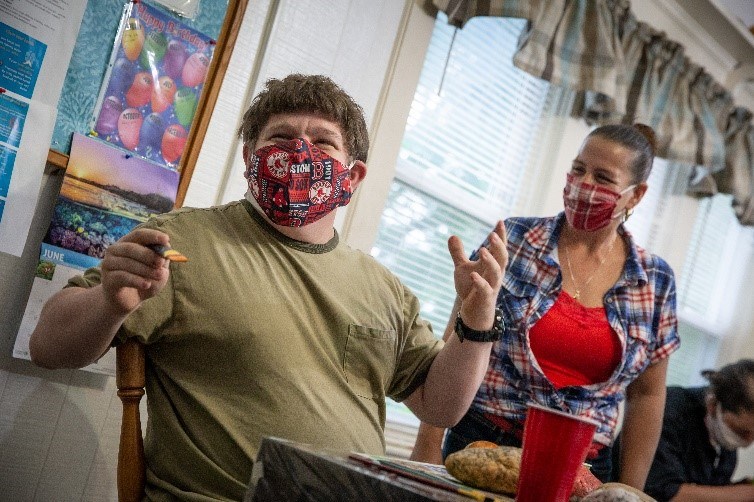Supported services for adults living with severe and persistent mental illness.
Thrive’s Residential Services connects adults who are experiencing severe and persistent mental illness with resources and community-based mental health support in a supported housing environment. The philosophy of Residential Services is based on a comprehensive yet intensive approach to treatment that helps residents achieve their highest quality of life.
Thrive’s compassionate staff help clients learn how to control the symptoms of their mental illness and achieve increased independence in all aspects of their daily lives. Thrive offers two types of supportive living environments: Group Homes and Supervised Apartments.
Group Homes
Group homes provide a stable, long-term living option to individuals suffering from severe and persistent mental illness. This type of housing is optimal for people who are experiencing a serious mental illness that impacts their ability to perform daily tasks. Thrive’s trained staff members are present 24/7 to assist residents with medication, daily living skills, meals, bill payment, transportation, and treatment management.
The family-like atmosphere of group homes is a major therapeutic tool and provides increased quality of life and continued growth among residents. Residential treatment helps individuals living with psychiatric disorders learn to manage their mental health symptoms while developing self-esteem, building life skills, and forming and strengthening relationships.
Residents are eligible for transportation services to and from psychiatric and medical appointments, counseling, and work-ordered day programs such as Thrive’s Hillsgrove House Clubhouse.
Supported Apartments
Residents of Thrive’s Supported Apartments have a higher level of independence than those living in group homes and do not require 24/7 care. They live in individual apartments and participate in a program of psychiatric treatment and therapeutic activities. Residents of supervised apartments have access to transportation to psychiatric and primary care appointments and work-ordered day programs such as Thrive’s Hillsgrove House Clubhouse.
Residential Services provides a comprehensive range of services including:
- Case Management Services – Each client is assigned a case manager who coordinates and monitors the activities of the client’s treatment team. The primary responsibility of the case manager is to work with clients to develop treatment plans, advocate for their needs, rights and preferences and provide linkages to resources in a variety of life domains, including physical health and wellness, housing, money management, legal, emotional, social, vocational and spiritual.
- Crisis Assessment & Intervention – Crisis assessment and intervention is available 24 hours per day, seven days per week. These services include telephone and face-to-face contact and are provided in coordination with the Center’s emergency services program.
- Symptom Assessment & Management – There is an ongoing comprehensive assessment of the client’s behavioral health symptoms, diagnosis, and response to treatment. Individual and family psycho-education is provided regarding mental illness, the effects and side effects of prescribed medications, and coping skills to alleviate the overall impact of symptoms, both on a planned and as-needed basis.
- Medication Administration & Monitoring – ACT team psychiatrists prescribe psychotropic medications and provide education about medication effects, benefits, side effects and risks. There is routine assessment of symptoms and behaviors in response to medication. Team members monitor and document medication side effects and provide supportive services, in collaboration with team RN’s and psychiatry staff.
- Dual Diagnosis Substance Use Disorder Services – Addiction treatment professionals provide a stage-based treatment model that is non-confrontational, client driven and considers the interactions of mental illness and substance use..
- Work-Related Services – Employment specialist conducts vocational assessments, and provides job development and vocational support/ skill development services to help clients value, find, and maintain meaningful employment in community-based job sites.
- Activities of Daily Living/ADL’s – Services to support activities of daily living in community-based settings include individualized assessment, problem solving, sufficient side-by-side assistance and support, skill training, and ongoing supervision.
- Social/Interpersonal and Leisure Activities – Services to support social/interpersonal relationships and leisure-time skill training. Clients learn to develop social skills, increase social experiences, and develop meaningful personal relationships as well as plan appropriate and productive use of leisure time.
- Peer Support Services – Services that validate clients’ experiences and guide and encourage clients to take responsibility for and actively participate in their own recovery. In addition, services to help clients identify, understand, and combat stigma and discrimination against mental illness and develop strategies to reduce clients’ self-imposed stigma. These services are provided by certified individuals who have experienced mental illness and/or substance use disorder and are in recovery.
- Support Services – Support services or direct assistance to ensure that clients obtain the basic necessities of daily life, such as:
- Medical and dental services
- Safe, clean, affordable housing
- Benefits counseling, Section 8
- Transportation
- Legal advocacy and representation
- Education, Support, and Consultation to Clients’ Families and Other Major Supports – Psycho-education on mental illness and the role of the family and significant others in the therapeutic process, including interventions to restore contact, resolve conflict, and maintain relationships with family/ significant others.
Residential Services Program Eligibility
- Age 18 or older
- Meets standard Community Support Program criteria
- Capable of learning self-preservation skills
- Experienced at least one of the following:
- Psychiatric treatment more intensive than outpatient care and more than once in his or her life
- A single episode of continuous structured supportive residential care other than hospitalization
- Has met at least two of the following criteria on a continuing or intermittent basis for at least two years:
- Markedly limited skills and/or poor work history
- Requires public financial assistance for out-of-hospital maintenance
- Unable to establish or maintain a personal social support system
- Requires help with basic living skills
- Distributed inappropriate social behavior which resulted in intervention from the mental health system
Thrive’s Residential Services
25 Railroad Avenue
Warren, RI 02885
401.247.4278
2756 Post Road
Warwick, RI 02886
401.732.5656

